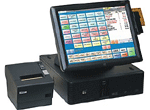
The sound of a cash register shutting could also be the death knell for your business as it is certain that your company is among the small minority of businesses that do not use POS (Point Of Sale) systems to deal with transactions. Perhaps small companies believe they can get away with using old-fashioned cash registers but if they have any intention of becoming a relevant business, they must invest in a POS system. It is virtually impossible to be a success in either the retail or restaurant industry unless your company has an up to date method of conducting transactions. Customers do not expect confusion to reign when they purchase goods or are paying for a meal. Failure to make their experience as pleasant as possible is certain to lose their custom.
Equipment
Uninformed individuals believe that there are no differences between the POS systems of a restaurant and a retail outlet. In fact, there is a world of difference as each type of business has its only unique needs. The most obvious difference between the two is the dearth of equipment contained by a restaurant POS system in comparison to its retail counterpart. In retail, the POS seen by customers is only one part of the entire system. Customers can see the different equipment like credit/debit card reader, scanner and receipt printer amongst other things. However, retail POS systems often have a separate computer in another office which takes care of issues such as control of inventory, storage of sales information and sales trends.
Restaurant POS systems on the other hand need far less equipment and indeed, they are usually a single unit capable of numerous tasks. The obvious reason for having less equipment on show is to save counter space. Most POS systems in restaurants are wireless with touch screens. Although this equipment is becoming more popular in retailers, many shops still have several other items along with their POS system. Restaurants are very different to retailers in many ways, especially when it comes to payment. A restaurant POS system needs to have the ability to keep a tab as a large number of eateries operate a policy whereby the consumers pays at the end of the meal. The system should be able to easily allow staff to create and save a customer account, adding or subtracting items throughout the course of the meal, whereas in a retailer’s a customer is expected to pay immediately.
Tracking Goods
Clearly then, the hardware and software of both industries will be completely different. Inventory tracking in a restaurant is far more difficult than in a retail outlet. A shop generally sells packaged goods, each of which can easily be accounted for. In a restaurant, there are dozens of different ingredients which are not easy to track. For example, it is quite common for a customer to order a meal from the menu but customize it. So when someone asks for no ketchup with mayonnaise instead, the POS system needs to be able to make the change and add it to the inventory report. If it is unable to do this, it will be more or less impossible for the restaurant to get a handle on its supplies. In fact, it would be easy for staff to manipulate this system and ‘borrow’ stock without fear of censure.
At a retail outlet, it is just a question of accepting the money because the built-in inventory system will look after the stock take. In a restaurant, the POS system needs to be a link between the waiters and the kitchen. Businesses that rely on the old fashioned system of manually writing down orders and walking to the kitchen are making a mistake. First of all, handwriting is often misread and secondly, the staff have to leave the customers to hand in the order. A good POS system will enable the restaurant to send orders to the kitchen electronically. The chef will see the order clearly printed and get to work. This system can be implemented via the issue of handheld wireless devices or else staff can enter the details on the computer. This process saves time and enables the waiters to continue serving the guest’s needs.
Customization
A final difference is the fact that POS systems for retailers are generally the same regardless of the store. The basic needs of shops remain the same so there is no need to alter the machine’s specifications. Restaurants on the other hand usually order custom made POS systems to fit their specific needs. Very large businesses especially feel the need to customize their POS system so that they can implement their own unique methods of serving the customer.
Regardless of whether you are running a restaurant or retail business, not having a POS system is an admission that your company is way behind the times and worse still, are making no attempt to catch up. Customers no longer tolerate quaint cash registers and their inevitable delays. The sad truth is: If a company cannot meet a consumer’s needs, they will bite the dust. There is no room for sentiment in modern business. Purchase a POS system today in order to speed up transactions, make orders easier while keeping a watchful eye on your inventory.
